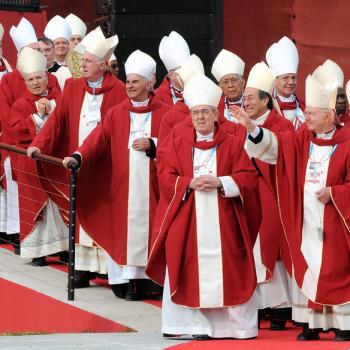Editor's Note: This article is part of the symposium, "What Is Progressive Christianity?" presented by the newly launched Patheos Progressive Christian Portal and in partnership with the Wild Goose Festival (June 23-26). Like us on Facebook to receive today's best commentary on Progressive Christianity.
When one is asked to consider anything in the field of religion, it is always a matter of "from where I sit," thus I offer my title here not as an apology, but as a recognition of my own limitations in dealing with something so vast and various as a whole division or segment of contemporary Christianity.
My own area of study and interest, over the last two decades, has been Emergence Christianity, both in this country and abroad. In pursuing that interest, I have, of course, had to consider Progressive Christianity in terms of whether it is or is not a part of that larger phenomenon. It seems to me, and has seemed so to me for some three or four years now, that Progressive Christianity is a sui generis of sorts. That is, while it may be, and undoubtedly is, a response to some of the changes, events, and upheavals of the last half-century or so, it nonetheless differs from Emergence substantively enough to not be regarded as either a variant or an example of Emergence Christianity. Having said that, one must also acknowledge immediately that many Christians in North America are simultaneously active in both Progressive conversations and in those arising out of, and/or concerned with, Emergence Christianity per se.
Despite that sharing of conversationalists, however, there still are some distinct differences between Progressive Christianity and Emergence Christianity, at least three or four of which should be mentioned even in so brief an overview as this one. For example, Progressive Christianity pivots on social justice. Social justice is, likewise, a major concern and hallmark of Emergence Christianity, wherever in the Latinized world it may be forming and becoming operative. The difference—and it is, to me, a telling one—is in the underlying approach to the issue.
In dealing with matters of social justice, the Progressive stance and course of action generally are first intellectualized, then politicized, and finally formalized. By contrast, the Emergence posture or approach is far more pedestrian and humble in both its articulation and its delivery. Emergence Christians will defend vigorously their position that as long as some act of social justice has been a matter of "our doing something for them," the act is fundamentally one of enlightened or informed self-interest, if not plain old commonsense. Social justice, Emergence contends, really is—really must be—an exercise in "us helping each other" in whatever way possible here and now because of the bond of commonality that is Christ in all of us.
There is a sharp difference in those two stances, of course. As a distinction, however, it is probably most graphically and clearly expressed in the oft-heard Emergence statement that Jesus didn't live in gated communities and He doesn't much want us to either. While such may be a piece of inflammatory hyperbole, it nonetheless is a telling observation or perhaps by now, an informing mantra.
Almost as remarkable is the way in which the operative approach to Scripture differs between the two groups. The Progressive stance, once again, is far more intellectualized than is that of Emergence. Born in a time of burgeoning Pentecostalism, Emergence Christianity and Emergence Christians are naturally inclined—increasingly so, in fact—toward the approach of communal discernment and direct appeal to the Holy Spirit for explication and direction. Such a stance allows Emergence to be more or less innocent of biblical literalism and far more inclined toward a kind of apophatic or Orthodox actualism.
Authority, for Emergence, is not yet firmly defined or ensconced, whereas for Progressives it tends to be fairly well rooted in situational, critical, and historical analysis. Progressive Christianity likewise (and more or less consequentially) retains more of the trappings of 20th-century denominational or institutional Christianity than does Emergence.
In much the same way, Progressive Christianity still continues to carry with it the cachet of post-Liberal Christianity, whereas terms like "Liberal" or "Conservative" Christianity are as lost on Emergence Christians as are all the "post-" labels that can still accrue to Progressive analyses and discussions.
Even when all the slicing and dicing and dissection are done, however, there is a shared resonance or informing similarity between the two bodies. That is to say, both seek the Kingdom of God here and now, as well as not yet here and still to come. That shared emphasis must ultimately be seen as greater than any separations of method and approach. It also is the common base that allows many active and/or influential Christians to participate without contradiction in the work and theologizing of both Progressive Christianity and Emergence Christianity in this country.
6/13/2011 4:00:00 AM




